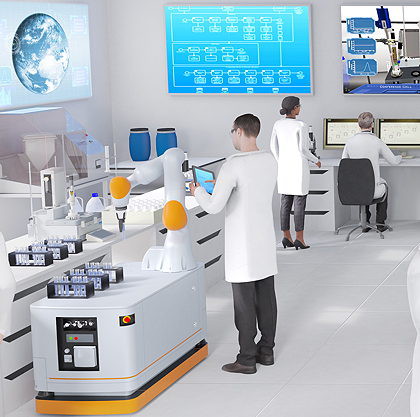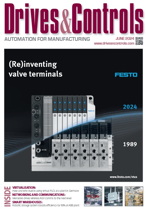£34m advanced manufacturing hub targets sustainability

The UK government is backing a manufacturing research hub that will use robots, smart automation and AI to create a sustainable circular manufacturing ecosystem. The £34.6m Manufacturing Research Hub in Robotics, Automation & Smart Machine Enabled Sustainable Circular Manufacturing & Materials (RESCu-M2) will be backed by £11m of funding from the UKRI Engineering and Physical Sciences Research Council (EPSRC), and £23.6m (cash and in-kind) from partner organisations over a seven-year period. These organisations include five other universities, local authorities and the Manufacturing Technology Centre.
The manufacturing hub is one of five new hubs aimed to addressing the commercialisation of early-stage research in key areas of manufacturing, such as semiconductors and medicines. ESPRC is investing a total of £55m in the hubs, with partner contributions bringing the total support to £99.3m.
The manufacturing hub, led by the University of Birmingham, will focus on the sustainable use of critical materials, and improving the productivity of Re-X (re-use, repurpose, repair, remanufacture and recycle) manufacturing processes. The goal is to enhance the way we re-use and refurbish technologies such as electric motors, batteries and medical devices. The aim is to increase the re-use of critical components by at least 75%, and to reclaim at least 50% more components.
For example, increasing the re-use of rare-earth materials from magnets by just 30% could secure the UK’s supply of these critical materials, which come mainly from politically unstable regions including China, and whose production is often environmentally damaging.
Re-X processes are currently much more labour-intensive than traditional manufacturing, resulting in many materials being disposed of via landfill or incineration. However, it is estimated that businesses could save up to £23bn per year by making low- or no-cost improvements.
The Hub’s director is Professor Samia Nefti-Meziani, who is also director of the Birmingham Robotics Institute. “We need to adopt radical new approaches in manufacturing that move away from a focus on producing new products, and then disposing of them when they reach their end of life,” she says. “Instead, we should be focusing on processes that prolong the useful life of products – particularly those including critical materials such as rare-earth elements.”
The Hub will bring together an interdisciplinary team, including experts in manufacturing, robotics, AI, automation, materials, chemistry, economics and lifecycle assessments. It will focus initially in four areas: energy, medical devices, electric drives, and large structures.

The environmental impact from the global consumption of engineering materials is expected to double in the next 40 years, while annual waste generation is projected to increase by 70% by 2050. The UKRI funding is intended to help achieve the circular economy requirements and sustainability goals set by the Government.
The four other hubs in the Manufacturing Research Hubs for a Sustainable Future programme are:
• The Advanced Metrology for Sustainable Manufacturing Hub, at the University of Huddersfield, which will receive £13.3m in partner finding, in addition to the £11m that the ESPRC is contributing to each hub. It will develop technologies such as ultra-fast and compact sensors intended to improve resource efficiency and productivity in sectors that rely on precision manufacturing. The targeted advances in metrology could reduce industry’s reliance on cheap international labour and cut the carbon cost of transporting manufactured goods.
• The MediForge Hub, at the University of Strathclyde, which has attracted £12.2m of partner funding, and aims to transform the development and manufacturing of medicines using an Industry 5.0 approach that harnesses advanced technologies such as robotics and AI for sustainable, resilient and human-centric medicine production. It is targeting a 60% reduction in raw material use and the reduction of waste; accelerating patient access to new medicines; and using technologies to reduce repetitive tasks to free researchers up for creative tasks.
• The Sustainable ChEmicals and materials MAnufacturing (Schema) Hub at the University of Oxford, which has attracted £22m of partner funding and aims to transform fossil-based polymer manufacturing into a sustainable, flexible and digital industry, improving its environmental
impact and resilience. By combining raw materials from the air, biomass and plastics wastes, renewable electricity-driven processes, and computational and information technologies, it aims to design future sustainable products for sectors ranging from construction and transport, to energy generation and consumer goods.
• The CSManuHubSust Hub, led by Cardiff University, which has £20m of partner funding and aims to capitalise on the huge opportunity of compound semiconductor manufacturing, as identified in the UK’s semiconductor strategy. The researchers will develop energy-efficient opto-electronics for use in emerging technologies and expand on the environmental benefits of compound semiconductors by creating new devices such as mercury-free mid-infrared detector arrays and devices that both communicate and illuminate, based on transistors and LEDs.
“Manufacturing accounts for almost a tenth of the UK’s economic output,” says science minister, Andrew Griffith, “but for the sector to keep growing and sustaining jobs nationwide, it has to tackle challenges ranging from reducing emissions, to cutting production costs.
“These new hubs will support UK researchers with the cutting-edge facilities they need, to help our manufacturers seize the benefits of technologies such as robotics and AI. Harnessing these innovations will cement the UK's position as a global leader in sustainable manufacturing.”
UKRI: Twitter LinkedIn Facebook





